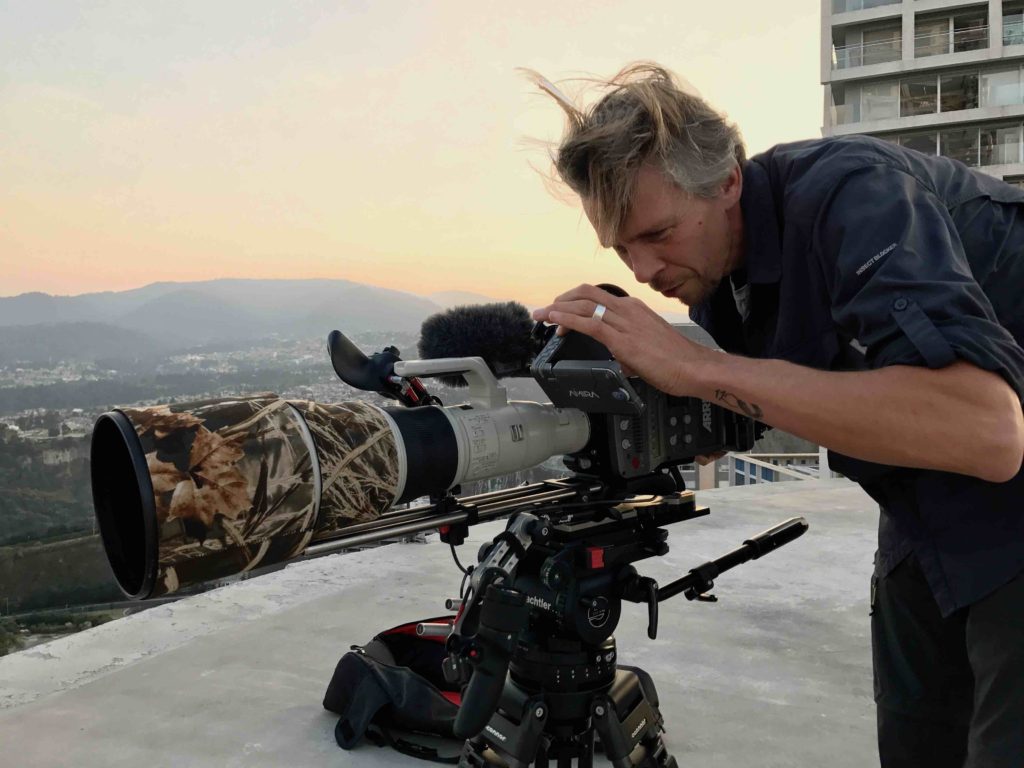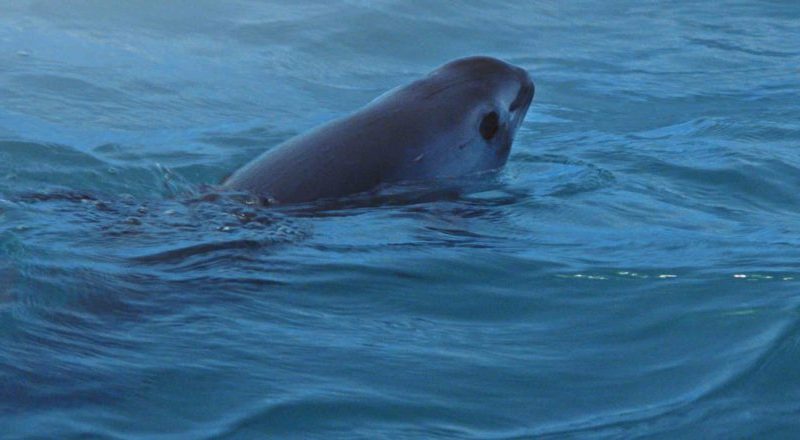INTERVIEW: ‘Sea of Shadows’ places environmental spotlight on rare vaquita porpoise
Photo: The vaquita, smallest and most elusive whale on earth, has an uncertain future. Photo courtesy of National Geographic / Provided by press rep with permission.
It’s probably safe to say that readers of this article have never heard of the elusive and endangered vaquita porpoise, a beautiful whale species found off the coast of the Baja Peninsula in Mexico. In the world of animal public relations, the vaquita — with its ringed, haunting eyes — loses out to the more iconic species of the humpback whale, orca, blue whale and bottlenose dolphin.
But the vaquita’s story is an important one to note, mostly because its tale may sadly come to an unfortunate end. The vaquita faces an uncertain future because the poaching of the rare totoaba fish in the Sea of Cortez has caused a disruption to the local marine life, including the whale species that has so few numbers left.
That’s where actor Leonardo DiCaprio and director Richard Ladkani enter the picture. The two teamed up for a riveting documentary project called Sea of Shadows, a followup to their successful film The Ivory Game, which detailed the plight of elephants. The new film is set to make its network premiere Saturday, Nov. 9 at 9 p.m. on National Geographic.
“We had just finished The Ivory Game, my last film on the extinction of elephants, and we wondering what could we do next to make this world a better place,” Ladkani said in a recent phone interview. “We had tremendous success with The Ivory Game in terms that we were able to change a law in government, for them to protect elephants by banning the ivory trade. So we were like, wow, a movie can have really unbelievable impacts even on a faraway foreign government and can save a species. So we were like, what are we going to do with that power.”
Then the call came from DiCaprio, one of the finest actors of his generation and someone who has helped advance environmental causes for many years. Ladkani said the celebrity call changed his filmic trajectory, and he immediately found his next project.
“He came to us in August and said, ‘Would you be interested in doing a film on the vaquita and its possible extinction … because I deeply care about this animal, and I’ve met with the Mexican president,'” the filmmaker remembers the conversation going. “So all these things were on the table, but we had to move within 24 hours because this operation of saving the vaquita was going to start six weeks down the road. Terra Mater, the production company, and I we stuck our heads together and were like, should we not? Then we’re like, let’s give this a go because with Leo behind this, helping promote the film and being on social media and active, this was going to be a win-win situation.”

The team agreed to document a rescue effort to find the vaquita and bring the species into a sanctuary, essentially saving them from the hazardous conditions of the poachers. Within this thrilling and unfortunate story, Ladkani spoke with scientists, high-tech conservationists, investigative journalists, Mexican navy officials and undercover agents. The story of this species’ demise (and possible rescue) was a complicated tale that featured corruption, cartels and cutting-edge conservation.
“My biggest concern was that nobody would want to see the film because nobody knows what even a vaquita or a totoaba is,” the director admitted. “They’ve never heard those terms before. I had never heard about those animals, but you could rest in peace because Leo was going to give it the attention that was necessary. That’s how it kickstarted.”
Ladkani and Terra Mater have a solid track record, given the success of The Ivory Game, a highly influential film. The filmmaker and the production company knew how they could work together on a common goal, and they knew they could handle a sped-up pre-production process in order for the cameras to be ready for the gutsy and engaging rescue mission in the waters off the Baja Peninsula.
Still, there were definite risks and unknowns.
“We didn’t really understand how big the story was going to get,” he said. “Everything sort of depended on us finding a vaquita, which was for me the biggest challenge because it had never been filmed before — ever. Nobody was ever able to capture one on camera, so this was going to be a huge challenge to emotionalize the audience to the cause. You have to show what you’re about to lose, what the world is about to lose, in order to care for it, so if we were not going to be able to ever find one and film one, I thought it would be very hard for the film to succeed.”
In the back of his mind, Ladkani had to develop a backup plan in case they didn’t find a vaquita (spoiler alert from the movie poster: they find one). The plan B was to focus more on the investigation into the poachers and cartel figures, relying on the brave testimonies of investigative journalists who had been working the story for years.
“I thought, OK, [hopefully] the vaquita rescue operation is a success, but maybe if it fails we have a backstory, which is the investigation story, which we could follow up as a fallback,” Ladkani said. “That could maybe be enough for it to turn into a good movie, but then we got both. We got the vaquita, even though it’s a very dramatic scene, but we also had this amazing investigation story. And then as we went along I saw Sea Shepherd on the frontlines being super active and fighting the poachers. … As we went along, the whole package kind of came together. All the ingredients for great storytelling were there, so all we had to do was turn it into a beautiful film.”
Now audiences have a chance to see the results of this epic journey.
By John Soltes / Publisher / John@HollywoodSoapbox.com
Sea of Shadows, directed by Richard Ladkani, premieres Saturday, Nov. 9 at 9 p.m. on National Geographic. Click here for more information.

